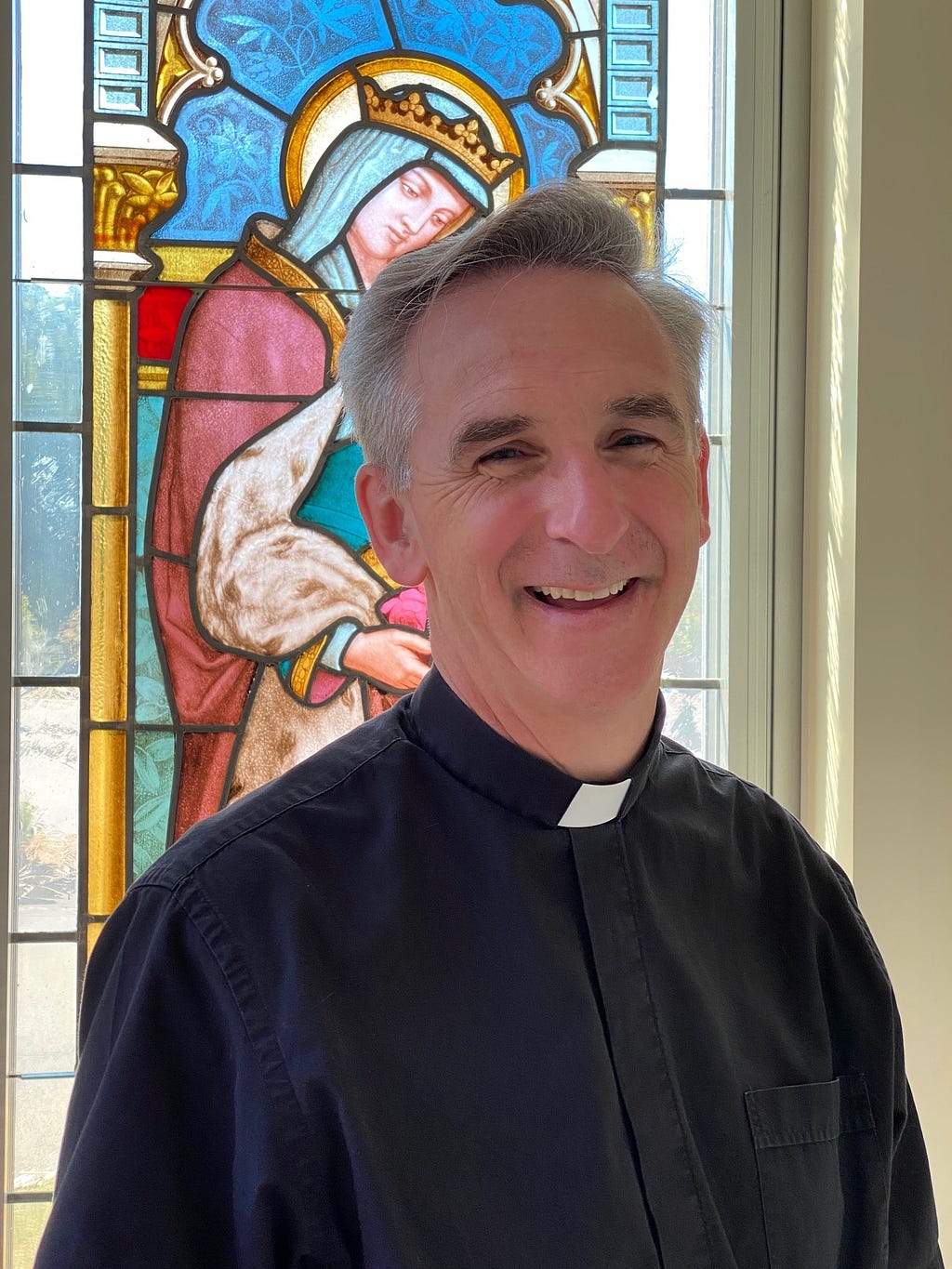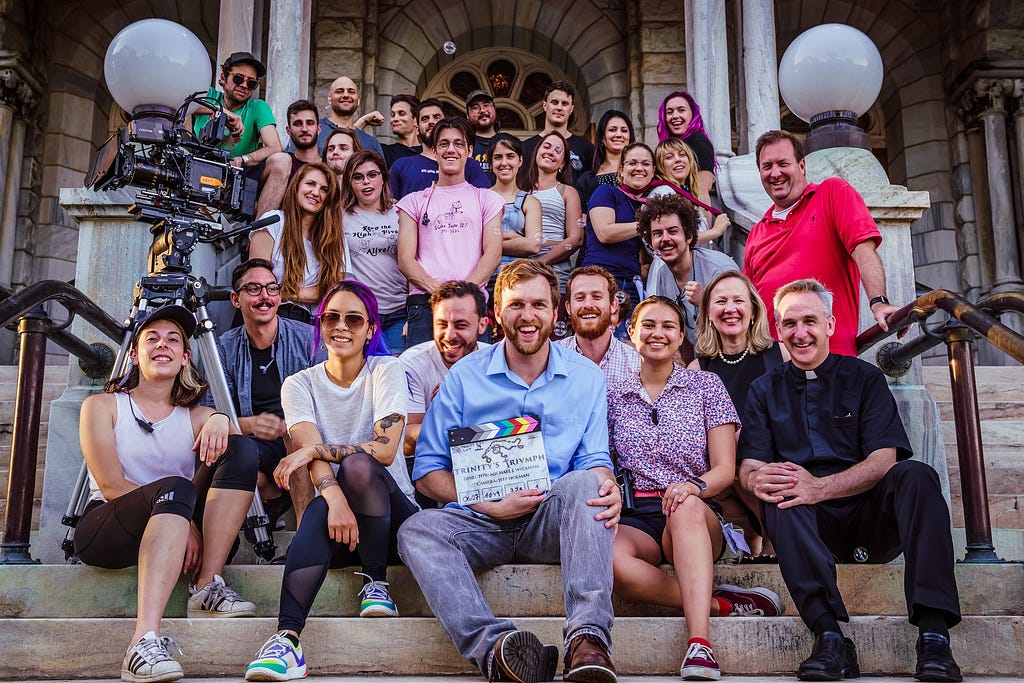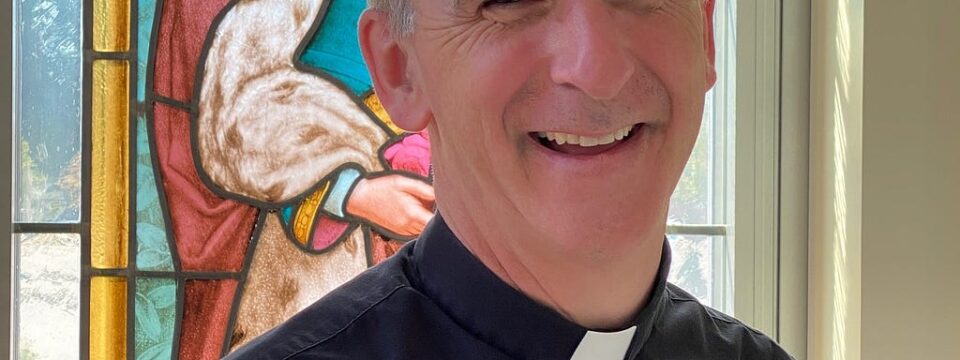Filmmakers Making A Social Impact: Why & How Filmmaker Father Stephen Fichter Is Helping To Change Our World

Finally, I wish I knew on the days when I wasn’t sure if Trinity’s Triumph would ever be made, how much joy I would feel when people who have seen the movie tell me how much they have learned. I often hear reactions like “I had no idea” or “I am so glad I saw the film. I really appreciate now the process leading up to ordination”, or “It’s such an honest portrayal!”
As a part of our series about “Filmmakers Making A Social Impact” I had the pleasure of interviewing Father Stephen Fichter.
Father Stephen Fichter originated the concept for Trinity’s Triumph and co-authored the script with Kathe Carson and Michael Wickham. He is the author of three sociological books, a Research Associate for the Center for Applied Research in the Apostolate at Georgetown, and has taught at the Graduate School for Religion and Religious Education at Fordham and at the Immaculate Conception Seminary at Seton Hall. He is the pastor at Saint Elizabeth of Hungary Church in Wyckoff, New Jersey, and the Episcopal Vicar of Education for the Archdiocese of Newark.
Thank you so much for doing this interview with us! Before we dive in, our readers would love to get to know you a bit. Can you share your “backstory” that brought you to this career?
My path to filmmaking is anything but linear. Before, I ever made a film, I became a Roman Catholic priest. I did most of my 13 years of seminary training in Europe, where I received Master’s degrees in Philosophy and Theology. After being ordained on the famous Y2K day as one of the first priests of the new millennium, I came back to the United States and obtained a third Master’s in Social Work from Fordham, and then a fourth Master’s and Ph.D. in Sociology from Rutgers. Currently, I am the pastor for 12,000 parishioners at Saint Elizabeth of Hungary Church in Wyckoff and the Episcopal Vicar of Education for the Archdiocese of Newark.
However, while I was in Europe, I began to toy with the idea of writing a movie script about the priesthood. I started to draft a project called Daring To Be Different. A friend of mine in Italy knew about my script idea and said that he would introduce me to Franco Zeffirelli. I spent an extraordinary afternoon with him at his villa on the outskirts of Rome. It was Zeffirelli who very much liked my first draft, but told me the script would be more interesting with three main characters instead of one. Once I had returned to New Jersey, I continued to build my network with two of my parishioners in Saddle River, Mary Higgins Clark and my co-writer, Kathe Carson. That is really where the journey of Trinity’s Triumph began.
It has been said that our mistakes can be our greatest teachers. Can you share a story about the funniest mistake you made when you were first starting? Can you tell us what lesson you learned from that?
I attended my first casting session in New York in May of 2019. It looked like an office building from the street, but inside, every floor was auditioning for everything from TV shows, to commercials, to Broadway. It was just fascinating. I got to our audition and sat down with the other producers and our director and watched a series of hopeful actors read from our script. Then a fantastic actress, Narci Regina, came in to read for the part of Maddie. She blew me away with her talent. When she finished, I was so enthused that I started clapping and told her she nailed it. When she left, the director turned around said, “Father, you can’t do that! We haven’t seen the other actresses, and we haven’t awarded the part!” For the rest of the session, I was careful to keep my opinions to myself. By the way, she got the part!
Who are some of the most interesting people you have interacted with? What was that like? Do you have any stories?
When I think about some of the amazing people that I have met, even I am astonished. For example, when Oxford University Press published my book Catholic Bishops in the United States: Church Leadership in the Third Millennium, I was given the opportunity to present the book personally to Pope Francis. That day the Pope gave a reflection on tenerezza, which is Italian for tenderness. His reflection and warm handshake had a profound impact on me.
I also had the improbable opportunity to speak with Mother Teresa on the phone. She answered the phone herself and was so disarming! I was asking if she would consider coming to Rome to speak at a conference that I was organizing, but she preferred to ask about my parents and fellow seminarians before she would let me get to the main reason for my call. I felt as though I was speaking with my loving grandmother.
At the other end of the spectrum, one of my friends is Nancy Murray, who is a Dominican nun and the sister of Bill Murray. Nancy had been visiting my parish in Haworth and asked if I could give her a ride to her brother Billy’s house. To say it was an amazing afternoon is beyond an understatement. Bill Murray is even funnier in person. He showed me the Cubs’ insignia that he just had painted on the bottom of his pool, had me take a nap on his 14th century Indian Prince rocking bed, and sent me home with two tomato plants and a set of golf balls. I’ll never forget how much fun we had that day.
Which people in history inspire you the most? Why?
There are three people who come to mind immediately. First, as a Catholic priest, obviously I am deeply inspired by Jesus Christ and His life. On a completely different front, I have long been a Charles Schultz fan. It’s hard to underestimate his use of art and copy in using the characters in the Peanuts cartoons to convey a deceptively simple Christian message. I am also intrigued with the great Jewish and Catholic philosopher, Edith Stein. Her life’s work was the pursuit of truth, beauty, and human dignity. She taught that the core of being a human being is empathy, and yet, she was a victim of the Holocaust.
Let’s now shift to the main focus of our interview, how are you using your success to bring goodness to the world? Can you share with us the meaningful or exciting social impact causes you are working on right now?
In particular, I am so pleased that Trinity’s Triumph has given me a platform to present a more realistic and contemporary portrayal of the seminary and what it takes to become a priest. Until now, movies about priests ran the gamut of Going My Way with Bing Crosby to Keeping the Faith with Ben Stiller and Edward Norton. No other film has looked at the humanity of the priesthood in the way we have. In the past, the priest has been mistakenly put on a pedestal. I think Trinity’s Triumph does a fantastic job of exploring the doubts and fears seminarians have and how faith points you in the right direction every time. My great hope is that a young man, who thinks he may have a calling sees our film and is inspired to at least try.
At the same time, the lesson that Monsignor Heck, beautifully portrayed by Joe Morton, gives at the beginning of the film is a universal message for all of us. He explains to the students the meaning of the latin word VITA. VITA is an acronym that stands for veritas, integritas, tolerantia, and amicitia — truth, integrity, tolerance, and friendship. Had we created a film about three law students, or three interns, or any other service industry that requires a lot of training to serve the needs of people in a community, it’s still a universal message that if you live by those four ideals you will have a good life. I have heard from several non-Catholics, who have seen Trinity’s Triumph, they are completely enamored of this scene in the movie.
Many of us have ideas, dreams, and passions, but never manifest it. But you did. Was there an “Aha Moment” that made you decide that you were actually going to step up and take action for this cause? What was that final trigger?
The “Aha Moment” was actually a gentle confluence of all the right elements starting to come together. When I met my co-writer and co-producer, Kathe Carson, I knew immediately that I had found the right partner with the right skill set that she had developed over many years in her own successful career. I was also speaking with my longtime friend from Bergen Catholic High School, Matt Hanna, who is a 25-year veteran of the television industry. He suggested we team up with his brother Thomas, who is our entertainment lawyer. Soon a handful of incredibly supportive investors gathered, and the money began to appear. One of our investors knew a production team called Tucci and Co. That is how we met our director, Michael Wickham. Anyone who read the script was hooked and wanted to see this story come to life. I knew it was real when I received my first production schedule email.
Can you tell us a story about a particular individual who was impacted or helped by your cause?
Actually, there are two individuals who stand out in my mind. I have a wonderful colleague in Newark, who is a straight-from-the-shoulder, no-nonsense type of person. I truly respect her forthrightness in all matters. So you can imagine how I was beaming when she told me that after she saw Trinity’s Triumph she was never more proud to be Catholic. Another standout comment came from an extremely bright college student, who candidly texted me that her generation really doesn’t like priests. When they think of a priest, they think of the abuse scandal. I have to admit that she is right because she was born after 2004. In her lifetime, she has only heard the scandal discussed in many different venues. However, and this is important, after she saw the film, she changed her mind about priests. She saw the behind-the-scenes truth, and it was a very different set of facts that she was accustomed to hearing. She had been touched by the humanity of the film.
Are there three things that individuals, society or the government can do to support you in this effort?
That’s such an interesting question. I think a primary thing that can happen is to support anyone you know who might be considering the priesthood. Don’t be too quick to quash that seedling. Give it a chance to take root. I also think that the reputation of the priesthood took quite a hit with the sex abuse scandal, but as we point out in the film, we are as outraged as everyone else. I would encourage people to see the tremendous amount of positive work that many priests are doing right now in many parishes. Finally, see our film, Trinity’s Triumph, and tell everyone you know to see it too. The more “eyes on” will help us spread the word about today’s wonderful priests.

What are your “5 things I wish someone told me when I first started” and why? Please share a story or example for each.
Another great question! First, I wish someone had told me that it could take as long as 25 years to get your film project to completion. I started from scratch and had to be creative about piecing together my contacts and one call or meeting leading to another call or meeting.
Second, I wish someone had told me that the first script I wrote and labored so carefully over each word would not be the script that would ultimately be filmed. The number of revisions that my co-writer, Kathe Carson, and I created — when printed out — are taller than Kathe, who is 5’3”.
Third, I wish I knew how fulfilling it is when you hear someone like Joe Morton take the words you wrote and give them new life. It was remarkable to hear words that had been scribbled in the margins or were ideas discussed over lunch become the scenes we remember so well in the film now.
Fourth, I wish I knew how so much of what you think is real on-screen is actually the work of so many behind-the-scenes people. For example, when the storm is raging one night at the cabin, the lightning was produced by a control board that was operated by our lighting director. The torrential rain was made with a silver pipe that had holes drilled in it and was propped up with C-clamps and scaffolding. It’s fun to think that I can create any scene in a subsequent script, and there will be a production team that knows how to make it!
Finally, I wish I knew on the days when I wasn’t sure if Trinity’s Triumph would ever be made, how much joy I would feel when people who have seen the movie tell me how much they have learned. I often hear reactions like “I had no idea” or “I am so glad I saw the film. I really appreciate now the process leading up to ordination”, or “It’s such an honest portrayal!”
If you could tell other young people one thing about why they should consider making a positive impact on our environment or society, like you, what would you tell them?
As I often say in my homilies, we are all just passing through this life. We don’t know how long we have here on earth. From a religious point of view, we are created to love God, love our neighbors, and love ourselves. In other words, the universal message becomes the best thing we can do is the greatest amount of good possible. Leave any situation better than you found it. I would encourage everyone to take their talents and put their gifts at the service of humanity. It’s an extraordinary thing to imagine.
We are very blessed that many other Social Impact Heroes read this column. Is there a person in the world, or in the US, whom you would like to collaborate with, and why? He or she might see this. 🙂
My immediate answer is Taylor Swift. People might think it’s odd that a 56-year-old priest would be aware of her music, but I think she is an extraordinary talent. I have written the lyrics for two songs in the past. I would love to do a third song with Taylor Swift based on the film. I think there are some real possibilities there.
I would also like to work with a network that would take our current film and turn it into a TV series. I think the greatest example of this is the 1970 movie MASH becoming the beloved TV hit with Alan Alda. The message of our TV series would be that reconciliation is possible. The tension in the world today weighs on my priestly heart. I would love to have something out there that works on people’s minds that we can find a common ground, and we can live in peace. I know that is the funny line in Miss Congeniality when Sandra Bullock toasts world peace, but it would be amazing to make greater use of the film art form to broadcast this message of world unity.
Can you please give us your favorite “Life Lesson Quote”? Can you share how that was relevant to you in your life?
Without a doubt, it is Jeremiah 29:11 — For I know well the plans I have in mind for you — plans for your welfare and not for woe, so as to give you a future full of hope. We used this in the film. It is one of the most consoling verses in the Bible, and it has helped me a lot over the years during dark times.
How can our readers follow you online?
To know more about our film, Trinity’s Triumph, and how to see it, just go to our website at trinitystriumph.com
This was great, thank you so much for sharing your story and doing this with us. We wish you continued success!
Filmmakers Making A Social Impact: Why & How Filmmaker Father Stephen Fichter Is Helping To Change… was originally published in Authority Magazine on Medium, where people are continuing the conversation by highlighting and responding to this story.
